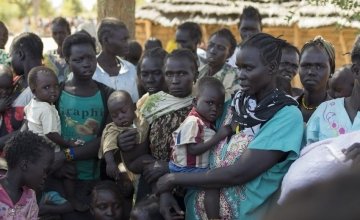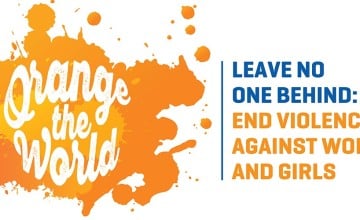
Read our 2024 annual report

Knowledge Hub
#MeToo – the global perspective

From the election of a US President whose negative commentary on women is no secret, to the outpouring of revelations about Hollywood executives and the subsequent #MeToo campaign, it has been a watershed year for spotlighting the ways in which women continue to be disproportionately targeted for abuse by those in power.
As horrific as these recent stories are, they are tragically only a drop in the ocean, particularly in the context of how women, especially in developing countries and situations of conflict, suffer ferocious levels of gender based violence every day. From sexual harassment and early marriage to the most extreme forms sexual violence, it is most prevalent in the poorer, more volatile parts of the world, in particular those engulfed in conflict. And as levels of conflict have risen dramatically around the world, women’s disproportionate exposure to violence during conflict and displacement has also risen.
Sexual violence as a weapon of war
South Sudan, Syria, Central African Republic, Nigeria, Somalia, the Democratic Republic of Congo are just a few of the countries where sexual violence is being systematically used as a weapon of war. Countless women among the displaced Rohingya population have had to seek urgent medical services for the sexual violence they have suffered – and as more people are displaced than at any time in recorded history, women are even more exposed to violence on dangerous journeys, in refugee camps and asylum centres.
It is now more dangerous to be a woman than to be a soldier in modern conflict."
Seizing the opportunity for change
Last month, the world marked the International Day for the Elimination of Violence against Women, which represented an opportunity for us to show solidarity with women around the world suffering from violence and to mobilise strengthened efforts to combat it. This year of all years, we must seize that opportunity.
The Irish Consortium on Gender Based Violence (ICGBV), are now mobilising and strengthening their collective efforts across 46 countries to tackle gender based violence. Formed in 2005 – in response to the systematic and horrific sexual violence in Darfur in Sudan – this unique collection of NGOs, Irish Aid, academics, and the Irish Defence Forces, demonstrates the need for collaboration and cooperation to effectively prevent gender based violence and ensure that survivors have access to services. The extensive and essential work of ICGBV is supported by Irish Aid and through the generosity of the Irish public, but globally it remains all too frequently underfunded and side-lined. In a world where gender based violence is estimated to affect up to 70 per cent of women in humanitarian emergencies, much more can and must be done.
The extent to which gender inequality is entrenched in all societies is indeed daunting, but the solutions are there and when employed they be transformative. This is why harnessing this moment of outrage is so crucial to deliver change.

Standing up for vulnerable women globally
Perhaps the most inspirational aspect of the reactions to the recent wave of sexual harassment revelations is that women have chosen to seize the moment to protest, to show solidarity with other survivors with determined resolve. This resolve must be sustained. But our outrage cannot be confined to Hollywood. We must use this opportunity to spotlight those that are less visible, less able to speak out. When Ebola became a global threat it finally prompted a global response. When Syrian refugees began washing up on the shores of Europe, the world focused its attention. If there is a positive that come out of the horrific actions of the growing number of offenders, it is that our collective revulsion can help galvanise a long overdue global movement of resistance, empowerment and change. That movement has to put the most affected and vulnerable women at its centre. Against this backdrop, the Irish Consortium on Gender-based Violence has just launched a new strategy – “Leaving No One Behind’ – in which it commits to deepening its presence and impact where the needs are greatest around the world, in the belief that collective action can lead to real change.
As Congolese advocate for women’s rights, Christine Karumba said last year when she addressed 250 students at an event in UCD:
Women are dying two types of death – a physical and an emotional death. The physical death is when you are no longer alive to walk the earth; and the emotional death is when you no longer see signs of hope and are dead inside. But I’ve learned that no matter how hopeless a situation may look, change is possible, and leadership makes that possible. This leadership is not about one individual − it is about the collective
Our outrage right now must not be wasted. It must spark a fire that will light the world and change it forever – for all women.
More from Dominic
Follow Dominic MacSorley (@aidwkr) on Twitter.


